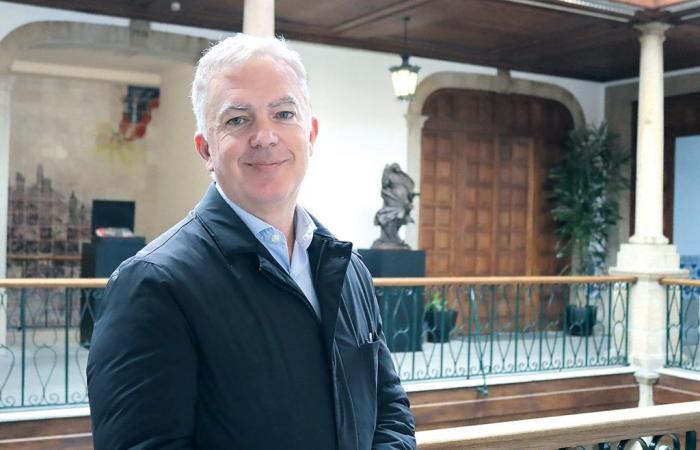-PUB-
Portugal has had multiple challenges in recent years. At municipal level, how has it been going?
The last few years have been full of achievements for the municipalities. Between 2015 and 2019, many of the cuts and measures that conditioned local power, which came from the time of the PSD and Troika government, were restored, namely in budgetary areas, municipal autonomy, the local finance law, the hiring of human resources and streamlining public procurement procedures. After 2019, I believe that a new impulse was generated that allowed greater autonomy in decentralization and the resolution of many problems that affected municipalities, with the transfer of skills and financial resources to municipalities in various areas, such as health, in education and social action. There was now full compliance with the finance law and a predisposition for the review of this law. There is even a commission that aims, together with the Ministry of Finance, to carry out this review. There was also the resolution of a problem related to the ADSE of municipal employees, a charge that was paid differently by the central state and the local state. I would say that these were years of recovery and strengthening autonomy for the municipalities, but obviously there is still a lot to do and the specifications for the next government are immense.
So, what are the challenges facing municipalities in the coming years? What remains to be done?
Decentralization needs to be deepened, both in areas where it has already been carried out and in areas that I believe are important to advance, such as health, so that municipalities can, in fact, make a difference and are not just mailboxes or taskmasters . And we have other demands, namely moving forward with the regionalization of the country, the creation of an inspection entity exclusively dedicated to local authorities, an entity that ended during the PSD government and which means that any anonymous complaint goes to the Public Ministry, which He often doesn’t know how local authorities work and creates a lot of fuss. This entity would allow us to see what are criminal issues that should be sent to the Public Prosecutor’s Office, but also to see issues that have no reason to go to the Public Prosecutor’s Office. We also believe that it is necessary to create conditions for the launch of competitive procedures for the attribution of low voltage electrical energy concessions, a process that is approximately four years behind schedule.
We believe that it is necessary to compensate municipalities for the installation of electricity production centers, promoting a solution for all renewable energies. We demand that waste tax values or rising system tariffs be considered and rethought, because these are values that have grown by more than 40% in recent years, and in some cases they are reflected in consumers and in others it is local authorities who are assuming these losses. We defend a new local finance law, a demand we have been making for a long time. We also believe that the participation of municipalities in State taxes should return to the levels of the pre-Troika period, returning to correspond to around 25.3% of the arithmetic average of IRS, IRC and VAT, and currently this value is at 19%. We believe that it is also necessary to reinforce the role of municipalities in Portugal 2030 and deepen the areas of decentralization, lowering VAT on school meals and public lighting to 6%. There is, in fact, a set of demands that remain on the table and have not been resolved. We expect this to happen, especially the participation of municipalities in State taxes.
“Portugal is, perhaps, the last country in the European Union that is not regionalized”
He spoke of the need to create a new local finance law. In which models?
The new local finance law should, from the outset, allow municipalities to have another share in State taxes (IRS, IRC and VAT). There should be compensation mechanisms for territories that have lower population rates, because it is one thing to have public transport in Lisbon, where for every kilometer traveled there are a thousand passengers, and another thing to have public transport in Mirandela where, perhaps, for every thousand kilometers there are 30 or 40 passengers. However, all passengers deserve to have public transport. Another example is in the area of water and sanitation, where there are areas where we have to lay kilometer-long pipelines to supply a much smaller number of people. There must be compensation mechanisms, that is, there must be a different distribution of funds across municipalities.
Decentralization is on the ground. In his opinion, is this model sufficient and does it replace regionalization?
No, I think it’s a way, but it’s clearly not enough. I think the idea was the following: to place in the CCDR’s a set of functions that a regional government should have in the future, in the context of culture, the environment, territorial planning, the application of community funds, realizing that whoever runs the CCDR, Currently, it is not universally elected. In this “regional” government that is the CCDR’s, there are already employees for the areas of education, health, agriculture, forests, the problem is that some of the leaders are not elected by all of us, they are appointed. At the moment, the presidents of the CCDR’s are elected by the region’s mayors, mayors, councilors and members of the Municipal Assemblies. Why not let the population decide? Why shouldn’t the president of the CCDR be held accountable? Decentralization allows us to put an end to some myths regarding regionalization, it is an experimental process. The CCDR’s model must be studied, deepened and applied and serve as a basis for regionalization.
It has already been seen that he is in favor of regionalization. Why?
In a very synthetic way, I think that those who are in the territory know it well and will know how to choose and govern better than those who are in Terreiro do Paço. I think the distribution of resources would be different, namely the application of community funds. I also understand that there must be an intermediate plan between the local authorities and the central government to discuss and apply some regional measures. Portugal is, perhaps, the last country in the European Union that is not regionalized. Portugal and Greece were the only ones, but Greece has already advanced and the question I ask is: if all the others are regionalized, and Portugal and Greece are, curiously, the countries with the worst levels of development, will the issue of regionalization Is it just a coincidence? The fact that we are not regionalized is certainly a brake on our development.
What could the interior gain from regionalization?
Perhaps if we had regionalization in practice, community funds would not be used to expand the Lisbon metro, because Lisbon is already an area outside of convergence, as it has a per capita income higher than the European average. With regionalization, each region would have its own funds and could apply them in a more functional and rational way, according to the needs of the territory.
We recently had legislative elections. Do you believe that regionalization can advance in the coming years?
Regionalization was in the Socialist Party’s electoral program and I believe it was also in the CDU’s program. It is always announced as something that we must achieve, namely by the PSD and, therefore, I believe that if the electoral programs were respected, regionalization would move forward. In fact, if the Constitution were respected, regionalization would have to advance.
Still within the scope of the elections, do you believe that the country will have a stable government for four years?
I believe that there are conditions for a stable government, it depends on the attitude of whoever forms the government, who will have the responsibility of knowing that it will be a minority government that must build bridges with other political forces. Whoever is in the opposition will have the responsibility to understand, without violating certain principles and also their electoral programs, that stability is an important value and that negotiation is fundamental to finding solutions that serve the Portuguese. The responsibility will be on both sides. Let’s see if there is maturity on both sides, assuming that the electoral promises are to be fulfilled. We are in a new cycle, in a new reality, with new party actors and an emerging party and, therefore, it is necessary that whoever comes to govern and whoever is in opposition has the responsibility to dialogue, knows how to build bridges and knows how to give in. Having a government that complies with the entire legislature is important.
Tags: regionalized brake development
--





